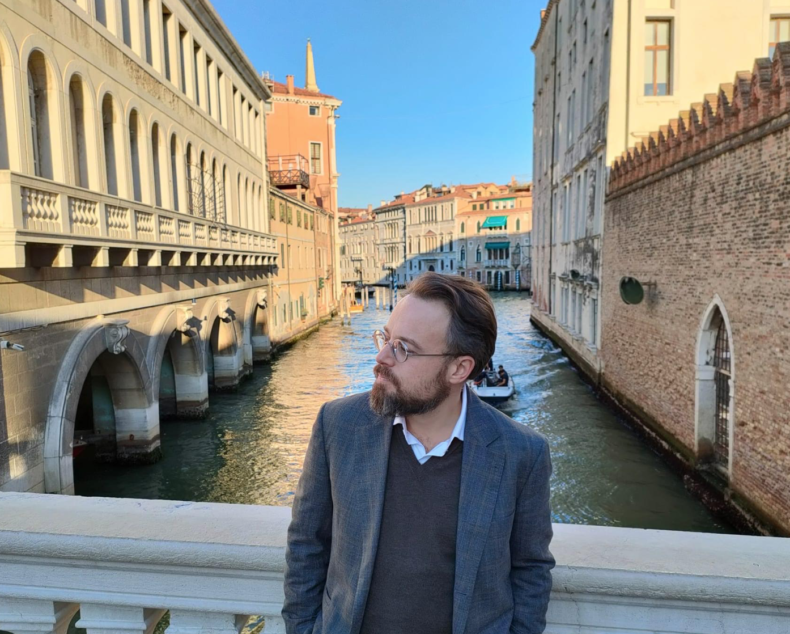Joshua Cohen: “In Brody, looking for Roth”

By Adam Smulevich
Joshua Cohen was in Jerusalem at the time it was announced that he had won the Pulitzer Prize for fiction. Just a few minutes later, he said, “my house was surrounded by reporters. None of them had read the book, clearly, and it was funny to be asked so many questions aimed at squeezing out the plot to be able to write something pertinent about it”.
To him it seems like a paradox that some critics have classed his last novel as Israeli literature. Indeed, “The Netanyahus: An Account of a Minor and Ultimately Even Negligible Episode in the History of a Very Famous Family”, that was recently translated and published in Italy by Codice Edizioni, was written by a Jewish American author who looks back at the legacy of literary giants such as Philip Roth and Saul Bellow, and it entirely takes place in the USA (in addition, it is set in 1959, the year of the publication of Ruth’s debut work “Goodbye Columbus”).
However, its protagonist is Israeli: the historian Benzion Netanyahu, author of a work about the Inquisition that is as great as controversial. Combining fact and fiction, Cohen offers an imaginative rendering of the story of when Benzion Netanyahu visited a college campus seeking an academic position. Benzion was accompanied by his obnoxious children, extremely noisy and annoying.
A few years later, his son Benjamin would become one of the most important and most criticized politicians of Israel, while his other son Yonatan would die in Entebbe, leading one of the country’s most famous overseas operations. The Jewish identity between past and present, Israel, America and the diaspora.
Cohen’s swift prose makes these fascinating topics, with their contradictions, even more exciting. The author was guest of honor at the latest edition of the Italian Jewish Book Festival. We met with him in Venice, where he stayed for a period of time – that coincided with the beginning of the new Jewish year 5783¬¬ – hosted by the association Beit Venezia and Casa delle Parole (House of words).
Did you get the chance to recharge your batteries after months on the crest of the wave?
Well, there’s something magical and reinvigorating about Venice. I must confess that I knew very little about the city’s Jewish history, apart from a few general facts. This was definitely a great opportunity to delve deeper. And then who knows, one thing leads to another…
Could it possibly serve as the setting for one of your next stories?
I don’t know, it’s not something that can be predetermined. Creativity works in a different way. But I certainly do not rule out the possibility of translating Venetian characters and situations into one of my future writings. In the meantime, I’ll write down some notes.
What is your relationship with Italian writers? Is there any Italian author you look to?
There’s a lot of them. Right now, if I have to name one, I would say Leonardo Sciascia, both for the intricacy and construction of his plot and for how effectively he is able to convey the local “color”, but also Curzio Malaparte and Cesare Pavese’s stories, among others. And I certainly cannot leave out some pillars of Jewish and Italian literature to whom I owe a lot: I discovered Primo Levi and Giorgio Bassani in my adolescence, and read their works between the age of 14 and 18; another author I love is Italo Svevo.
In the past, you worked as a journalist in Eastern Europe, documenting the complex, troubled, but also fascinating reality of those Countries. What do you bring with you from that experience?
I bring with me very vivid memories, in particular of the time I spent in Ukraine, between Lviv and Odessa. Two cities that, even in their Jewishness, preserve their identity and deep wounds. I have witnessed how people there crave Europe. The idea that there is someone that is trying to suppress their yearning is simply shocking.
In today’s Ukraine is the city of Brody, hometown to your favourite writer: Joseph Roth.
Visiting the city of Brody was an emotionally charged experience. Although it was partly rebuilt, it still conveys the atmosphere of a border city. The literature that I love the most is the one that deals with boundaries and existential precariousness, an art Roth was an undisputed master of.
How did you come across his work?
Mine was like a teenage infatuation. The first work of his that came into my hands was “The Radetzky March”, one of the most important books ever written about the Austro-Hungarian Empire. It painted the twilight of an era.
What are you planning on doing next?
For now, I plan on enjoying some free time and maybe find out some more about Italy and its Jewish heritage. I have already visited some synagogues in the past. The most beautiful, in my opinion, is that of Casale Monferrato. The explosiveness of colors, its charm… it is really inspiring. I think Italian Jews should be proud of their history, their heritage and their resilience.
Translated by Annadora Zuanel, revised by Martina Bandini, students at the Secondary School of Modern Languages for Interpreters and Translators of the University of Trieste, interns at the newspaper office of the Union of the Italian Jewish Communities – Pagine Ebraiche.
